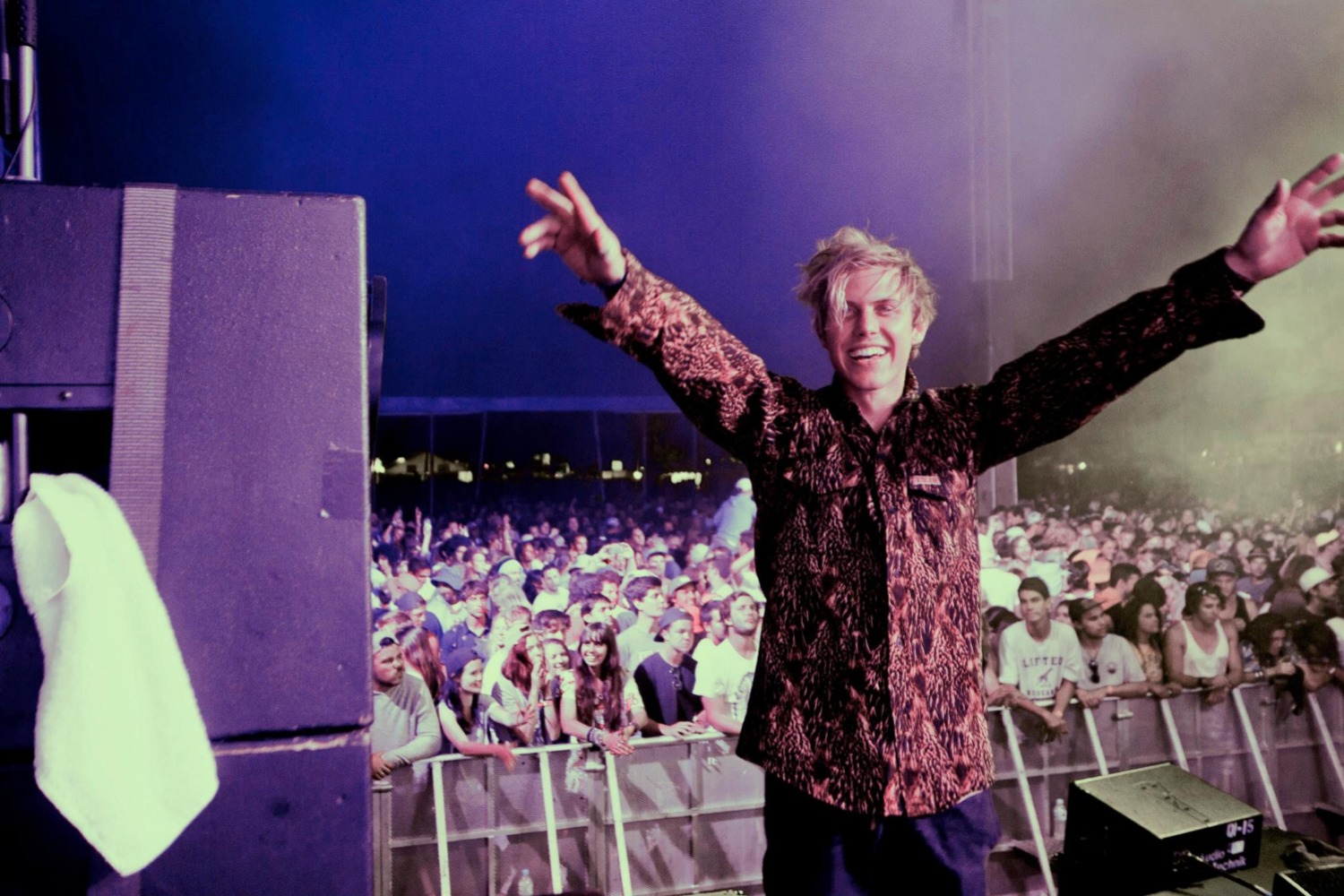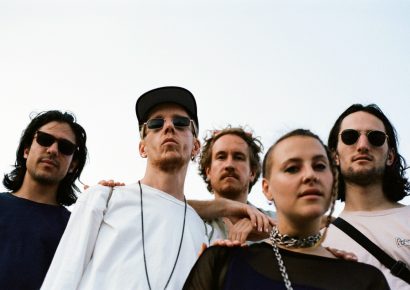Tapping into their imaginations to create RÜFÜS DU SOL's cathartic fourth album, 'Surrender' – while all gigs were on hold and the world was locked down – James Hunt and co. would often ask themselves, 'If we were at a show, would this feel good?'
Looking at photos or footage from the festivals and large-scale shows that are happening overseas at the moment looks strange, even to RÜFÜS DU SOL, as we slowly emerge from lockdown hibernation here in Australia, eagerly awaiting the return of live shows.
“We played a festival called Austin City Limits last week,” RÜFÜS DU SOL’s James Hunt, who is currently in San Antonio, Texas, shares.
“Being able to play shows again carries so much more meaning and I’m very grateful that we can do that. It’s very surreal being at shows again. It literally feels like a dream when I go up there.
“I’m like, ‘Is this really happening? Are there thousands of people out there right now?’ It’s crazy. You can see people in the crowd connecting with the music. It feels a lot more special now; people are more grateful than ever to be going to live music shows.
Keep up with the latest music news, festivals, interviews and reviews here.
“I’m seeing a lot more people sobbing and having cathartic experiences. It’s really cool to see that and it still blows my mind that people have that kind of experience to the music we create.”
Vocalist Tyrone Lindqvist’s trademark wistful, lovelorn delivery has always been enough to inspire dancing with tears in your eyes, but throughout Surrender – RÜFÜS DU SOL’s fourth studio album – he aims straight for the heart.
During ‘Make It Happen’, a standout album track, Lindqvist laments, “Where were you when I was young?/ I wish I knew you then…” while a dinky toy piano hook adds nostalgic resonance.
Then enter a children’s choir to deliver what Hunt describes as “a Beatles-esque kind of mantra”: “Love can change your life/ Love can make it happen.”
Of recruiting a children’s choir for this album, Hunt tells: “We were thinking of ways to find new inspiration for the record, or a new aesthetic; something we hadn’t really explored before.”
He then references that banging, Parisian electronic duo Justice “who use children’s choirs in a really cool way in their music, by counteracting the dark analog-synthy moments”.
“We were supposed to record a choir in Melbourne, actually, because our sound engineer that we tour with lives there, and unfortunately that just couldn’t happen because of the lockdown.
“So then we found a choir in LA and the [choir master] was able to translate exactly what we wanted to the kids, in their own little language, and they just understood it.”
When you consider this song’s lush arrangement – swelling, layered synths and hi-hat-heavy drumming – the fact that a toy-piano hook can hold its own within the mix is truly astounding.
“That’s the beauty of working with Cassian,” Hunt extols, “he mixes all of our records and he’s amazing at what he does, and allowed everything to breathe in its own space. He’s a DJ from Sydney and he’s a really good friend of ours. He mixed ‘Desert Night’ on our first record [Atlas] in, like, 2013.”
Since forming in 2010, RÜFÜS DU SOL have released a string of chart-topping albums while dominating the global festival circuit (they’ve already played at Coachella three times).
When RÜFÜS DU SOL first started making music and decided to relocate to the US, Hunt remembers one of their band goals was to play “certain types of shows”.
“We’re playing some stadium shows in LA in November, which was definitely a goal we discussed,” Hunt points out.
“And then to be fortunate enough to sell some of those shows out! Yeah, it definitely reinvigorates you and makes you kind of see what the real priorities are: your health and the creation of music itself. I think we got better at doing that on this record.
“We were touring pretty heavily in 2019 off the back of that last record, Solace – there wasn’t really any space or time to check in with yourself – and I think by the time the pandemic came around it was the perfect time for us to reconnect and check in with each other as a band and say like, ‘Where are you at? Look at what our priorities are, try and remember why we do what we do.
“It was really good timing, because we had planned to go to Joshua Tree in April last year – in 2020 – just for two weeks to start writing and then when everything started going into lockdown we extended our stay to four weeks and then six weeks and then eight weeks, and then it ended up becoming this really pivotal period of resetting.
“We reassessed the way we write music there: we introduced some structure, finally; we’d almost spent years avoiding structure and revelling in the chaos of writing ‘til 6am every night.
“So this time around we introduced a bit more of a routine. We’d wake up and do a meditation and do a sauna, do a workout together, do an ice bath and by the time we’d go into the studio we would feel like we’d cleansed ourselves. Then we would stop writing at set times – like, at 8pm – and go to bed and then start again.”
So the exact opposite of RÜFÜS’ previous, typically nocturnal, songwriting approach?
“Very much so. I definitely have always viewed myself as a night owl and I definitely have this idea, that I was fixated on, that creativity hits its peak in the late hours, so, after 8pm.
“A lot of good ideas have come from that and we’ve written a lot of great music super-late at night, but it was cool to trust the process: ‘Okay, we’re just going to work normal hours and then prioritise our health – our mental and physical health – and then trust that the music will come. It did and it felt really good.”
It was actually after pulling an all-nighter during the two-day songwriting session that birthed the RÜFÜS DU SOL track ‘Lost In My Mind’ that the trio first joked about performing a sunrise slot in the desert, to no one except the occasional passing rattlesnake.
“I remember getting a lot of comments from people saying how great it was and they were like, ‘Oh, it’s so crazy that you guys pivoted and recorded this because all the live shows got cancelled,’ and I was like, ‘No, it’s just completely serendipitous that it happened like that. We recorded that in September, 2019.’
“It did work out for us in a really cool way. We’ve been getting amazing feedback of the special experiences people have had with [RÜFÜS DU SOL: Live From Joshua Tree] – you know, listening to or watching it with friends while in lockdown; pretending that they’re at a live show – after having live music ripped away for such a long time. It’s sort of special that we could provide that for people and it also feels like a timestamp of that point in time. So I can look back on it and go, ‘Oh, this came out when the pandemic started.’
“Any time we put music out it’s like a timestamp of a point in our lives. Surrender is very much where we were at personally and what we were going through, what we learned and the changes we made in ourselves, but also where the world was at. I feel really proud of this record.
“We were trying to use our imaginations as much as possible as to when we could finally play shows again – we were just imagining that feeling – and I think that’s something we’re good at: being imaginative as to being an audience member at one of our shows and saying, ‘Oh, would this lyric hit hard? Would this beat have impact? Would this moment feel really good at a show of ours?’ Or, ‘If we were at a show, would this feel good?’
“I think because we were deprived of going to shows, we had to use that muscle to envision what would be a cool next step for us or what would feel exciting. I guess that bled through.”
Surrender is out from Friday October 22 via Warner.

